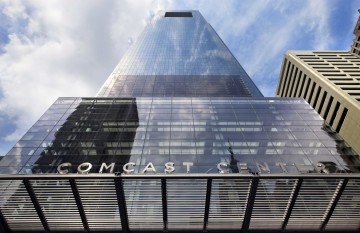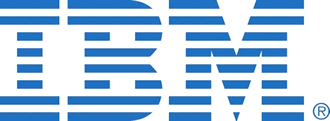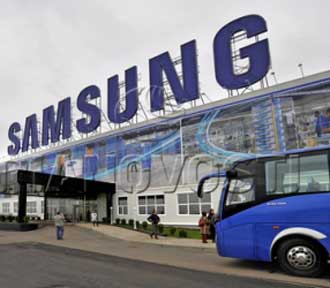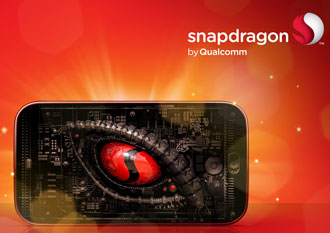 An estimate by Gartner analysts predicts that connected kitchens are going to save us 15 percent by 2020.
An estimate by Gartner analysts predicts that connected kitchens are going to save us 15 percent by 2020.
 An estimate by Gartner analysts predicts that connected kitchens are going to save us 15 percent by 2020.
An estimate by Gartner analysts predicts that connected kitchens are going to save us 15 percent by 2020.
 Circular Devices thinks that corporations can use discarded computing modules and smartphones to build supercomputers.
Circular Devices thinks that corporations can use discarded computing modules and smartphones to build supercomputers.
The outfit is working a modular smartphone concept, Puzzlephone, and hopes to ship working products before the end of the year. The idea is to increase the longevity of smartphones and reduce waste in the process.
The plan is to create a Puzzlecluster platform made out of the old phones and use it as a company supercomputer.
Alejandro Santacreu, CEO at Circular Devices, said that the Brain module includes the CPU, which will help power the clusters. The plan is also to reuse old battery modules for back-up power. Drawings of the Puzzlecluster architecture show a chassis with slots for the reused modules, which can then be interconnected with others to create the cluster. Just one unit could also be used as a desktop computer.
The first CPU modules should be available for reuse by 2017 so we are talking a long way into the future. But the goal is to deliver a scalable product which can be used by small and medium enterprises, public institutions and data centres. Potential applications include rendering and data analytics, according to Circular Devices. If the cost is low enough, hobbyists and students could use it to learn more about programming for parallel computing.
While corporates might be the only one which have enough old smartphones to create clusters, the work builds on the popularity of the Rasberry Pi single-board computer which is being built into supercomputer clusters as the moment.
 Software giant Microsoft reported a fall in its quarterly profit as sluggish PC sales dampened demand for Windows software and the company struggled with the impact of the strong US dollar.
Software giant Microsoft reported a fall in its quarterly profit as sluggish PC sales dampened demand for Windows software and the company struggled with the impact of the strong US dollar.
Shares of the world’s largest software company, which have surged to 14-year highs in the past few months, fell three percent.
The fall did not seem to faze the cocaine nose jobs of Wall Street who seemed to be expecting it. Not much can really stand up to a high dollar pressure and most thought the numbers were good enough.
Microsoft’s flagship Windows business has been under pressure for three years as PC sales have declined, although the market appears to be stabilising in recent months.
Currency shifts against the strong U.S. dollar also crimped profit in the fiscal second quarter, ended December 31, although Microsoft did not specify by how much. Microsoft gets almost three-quarters of its revenue from overseas, but a significant amount of that is still in US dollars.
Commercial licensing is chiefly sales of Windows and Office to business customers, which is Microsoft’s biggest revenue generator.
Microsoft reported profit of $5.86 billion for the latest quarter, compared with $6.56 billion last year.
Sales rose eight percent to $26.47 billion, largely due to the acquisition of Nokia’s phone handset business last year.
Analysts had expected revenue of $26.3 billion including some restructuring costs.
 LG is behaving oddly over moves by Qualcomm to fix overheating problems in its Snapdragon 810 chip.
LG is behaving oddly over moves by Qualcomm to fix overheating problems in its Snapdragon 810 chip.
Samsung told Qualcomm it would not use the chip for its Galaxy S6 model because of overheating problems and Qualcomm suggested it would make a few modifications.
However LG, which is also using the chip, appears outraged. Its initial response to Samsung’s statement was that the chip never overheated and there were no problems. Now it is threatening to take legal action against Qualcomm if it modifies its latest Snapdragon 810 chip.
Its argument is that if Qualcomm modifies the Snapdragon 810, it means that the company admits the chipset has a flaw. Then it could trigger legal disputes, a spokesLG said.
So in other words – LG claims there is nothing wrong with the chip, but if Qualcomm admits there is something wrong with the chip then it will sue.
The question here is then why LG did not detect the Snapdragon’s fire breathing qualities.
It has been suggested that Qualcomm will provide a modified chipset to Samsung, something that Qualcomm and Samsung Electronics declined to confirm.
The Snapdragon 810 is designed as a 20-nanometer flagship mobile processor for top-tier smartphones.
The system on chip (SoC) integrates the fourth-generation long-term evolution advanced model (LTE-A), dubbed category 6, and theoretically supports up to 450 megabits-per-second data download speed.
But Samsung was worried that the chipset had a serious “throttling” problem that forcibly limits the graphic processing performance when it overheats, reports said.
Analysts said that a chipmaker could modify a new chip before mass production and Qualcomm may update it if its major client Samsung is uncomfortable with the overheating problem.
Qualcomm has said it will start mass-producing the Snapdragon 810 in the first half of the year.
For Qualcomm, Samsung Electronics is one of the most important partners, so the company is likely to show some reaction to the overheating issue.
 Big Blue has denied claims that it is about to fire 26 per cent of its workforce.
Big Blue has denied claims that it is about to fire 26 per cent of its workforce.
The dark satanic rumour mill manufactured a hell on earth rumour which tipped up in Forbes magazine. If the rumour was right, 112,000 employees could be laid off.
IBM admitted that it is cutting jobs, and said as much in its latest earnings report last week, but those reductions will affect “several thousand” employees, a “small fraction” of what Forbes reported.
The technology giant has been steadily reshaping its 400,000-plus staff for several years, laying off workers in some areas and hiring in new growth businesses.
The source of the rumour was pseudonymous Silicon Valley technology gossip columnist Robert Cringely who claimed that Biggish Blue was going to break with that gradual approach and suddenly lay off 26 percent of its global workforce.
IBM did not issue a formal denial of the report, but strongly suggested it was inaccurate.
A spokesperson said that if anyone had checked the information in IBM’s public earnings statements, or had simply asked it, she or he would know that IBM has already announced the company has just taken a $600 million charge for workforce rebalancing. This equates to several thousand people.
Last week, Chief Financial Officer Martin Schroeter told investors on IBM’s fourth-quarter earnings conference call that the company was taking restructuring charges of around $580 million, but he did not specify the number of jobs affected.
But Schroeter said in the same meeting that IBM was not going to replicate the same level of restructuring that we had last year… “It will be a lower amount.”
All this seems to suggest that IBM will fire about 8,000 people this year, in line with recent years.
 The Comcast/Time Warner Cable deal is showing the extent of corporate control over corrupt US politicians in all its ugly glory – not that anyone seems to care.
The Comcast/Time Warner Cable deal is showing the extent of corporate control over corrupt US politicians in all its ugly glory – not that anyone seems to care.
According to The Verge three politicians sent letters to the Federal Communications Commission that were ghostwritten by Comcast. The letters were signed by the politicians that mimicked Comcast talking points and cut, and pasted Comcast’s own statements.
What was happening is that Comcast official sent the politicans the exact wording of the letter he would submit to the FCC, finishing touches were put on the letter by a former FCC official named Rosemary Harold, who is now a partner at one of the nation’s foremost telecom law firms in Washington, DC. Comcast has hired Harold to draft letters that contained phrases that the FCC wanted to hear to approve the proposed merger.”
A letter from Oregon Secretary of State Kate Brown “was almost wholly written by a Comcast Government Affairs specialist.” The other politician featured in the story was Mayor Jere Wood of Roswell, Georgia, whose letter to the FCC was written word for word by “a vice president of external affairs at Comcast.”
And what did the politicians get from signing the letter? Brown has received $9,500 from Comcast in donations, according to the National Institute on Money in State Politics.
Advocacy groups generally haven’t made any secret of their signature gathering tactics, even issuing press releases boasting that as many as 400,000 people signed petitions urging regulators to reject the merger.
Of course, this is the Land of the Free so no one is resigning over what would be seen in civilised countries as bribery or, at the very least, subversion of democracy.
 Following lukewarm quarterly financial results last week, reports claim IBM is set to cut over a quarter of its workforce this week.
Following lukewarm quarterly financial results last week, reports claim IBM is set to cut over a quarter of its workforce this week.
 A secret search warrant from a judge in a US federal court forced Google to turn over Wikileaks’ emails and data.
A secret search warrant from a judge in a US federal court forced Google to turn over Wikileaks’ emails and data.
 Nanotechnology is one of the great hopes of the electronics industry as Intel’s Moore’s Law reaches its inevitable end.
Nanotechnology is one of the great hopes of the electronics industry as Intel’s Moore’s Law reaches its inevitable end.
 A buyout deal by Apple effectively nixed Motorola’s chance to put a fingerprint sensor under the bonnet of its Nexus 6.
A buyout deal by Apple effectively nixed Motorola’s chance to put a fingerprint sensor under the bonnet of its Nexus 6.
Motorola CEO Dennis Woodside said that the dimple at the back of the Nexus 6 was originally intended to play host to a fingerprint sensor. After all it had all the technology – it was a pioneer in bringing fingerprint recognition to its Atrix 4G smartphone.
At the time Motorola used Authentec which was purchased by Apple a year later for a price of $356 million.
Authentec was the best supplier around, “the second best supplier was the only one available to everyone else in the industry, and they weren’t there yet”.
Apple’s buy out effectively meant that the Nexus 6 was left without biometric authentication and the world was given the impression that Apple was the first to put the technology on a mainstream phone.
It looks like Motorola made the right move. The HTC One max had the slow and buggy experience that puts users off trying to use the feature.
 Software king of the world Microsoft announced a deal to buy Revolution Analytics, the top commercial provider of software and services for the open-source R programming language for statistical computing and predictive analytics.
Software king of the world Microsoft announced a deal to buy Revolution Analytics, the top commercial provider of software and services for the open-source R programming language for statistical computing and predictive analytics.
Joseph Sirosh, Microsoft corporate vice president for machine learning, said the acquisition was to help more companies use the power of R and data science to unlock big data insights with advanced analytics.
Financial terms of the deal were not disclosed. Revolution Analytics is based in California with offices in London and Singapore.
David Smith, Revolution Analytics’ chief community officer, said that he was excited the work done with Revolution R will come to a wider audience through Microsoft.
“Our combined teams will be able to help more users use advanced analytics within Microsoft data platform solutions, both on-premises and in the cloud with Microsoft Azure. And just as importantly, the big-company resources of Microsoft will allow us to invest even more in the R Project and the Revolution R products.”
However Revolution is Open Source and uses the R programming language, which is a data analysis tool widely used by both academics and corporate data scientists. Revolution Analytics was best known for offering developer tools for use with the R language, and though Microsoft already works with R it is a huge change in direction to own something like Revolution.
Revolution was founded in 2007 by Yale University computer scientists to create a suite of tools for working with R. The company develops both a free, open source community version of its Revolution R suite of developer tools, as well as paid commercial versions of the software.
Revolution Analytics created tools that extended the open source version of the R language to help it get under the bonnet of big data.
Microsoft will continue to support Revolution’s existing products and customers.
 Apple and Samsung appear to have buried any hatchets they might have had during the legal battle over the shape of the smartphone.
Apple and Samsung appear to have buried any hatchets they might have had during the legal battle over the shape of the smartphone.
While the legal battle raised over such crucial matters as whether or not Steve Jobs invented the rounded rectangle, Apple moved away from Samsung as its main producer of chips. In fact analysts believed that in the long term Samsung would lose any Apple production completely.
According to the Maeil Business Newspaper it seems that Apple has changed its mind and Samsung is back to being the main supplier of processors powering Apple iPhones.
It looks like Samsung will be responsible for around 75 percent of the chip production for the next iPhone, the South Korean newspaper said.
The newspaper did not say how much the contract is worth and what other company will be supplying Apple. Samsung will make the chips from its factory in Austin, Texas, according to the report.
What appears to have happened is that not only has the row between Samsung and Apple cooled, Jobs’ Mob discovered that Samsung’s rivals, such as TSMC were not up to snuff or had capacity problems.
 If it was not bad enough that Malaysia Air keeps losing its aircraft, or they’ve shot down after flying though a war zone, it appears the outfit is now being targeted by hackers.
If it was not bad enough that Malaysia Air keeps losing its aircraft, or they’ve shot down after flying though a war zone, it appears the outfit is now being targeted by hackers.
A group calling itself “Official Cyber Caliphate” hacked on Monday the official website of national carrier Malaysia Airlines (MAS), although the airline said its data servers remained intact and passenger bookings were not affected.
The website, www.malaysiaairlines.com, showed a photograph of a lizard in a top hat, monocle and tuxedo, surrounded by the messages ‘404 – Plane Not Found’ and ‘Hacked by Lizard Squad – Official Cyber Caliphate’. A rap song was also played, showing that the Lizard Squad is familiar with musical as well as hacking atrocities.
However MAS insisted its website was not hacked, but that users were redirected to a hacker website. It said the official site would be back up within 22 hours.
“Malaysia Airlines assures customers and clients that its website was not hacked and this temporary glitch does not affect their bookings and that user data remains secured,” it said.
Malaysia Airlines lost two flights last year. Flight MH370 disappeared last March with 239 passengers and crew on board and Flight MH17 was shot down over eastern Ukraine on July 17, killing all 298 passengers and crew.
 SAP, the maker of expensive esoteric business software which no one really understand wants to deliver its product onto the cloud.
SAP, the maker of expensive esoteric business software which no one really understand wants to deliver its product onto the cloud.
This means you can be completely baffled by the product, without having to store it on your local servers.
Luka Mucic told the Euro am Sonntag business weekly that contract cloud work becomes profitable over time and in the long term; they can definitely become more profitable than classic licence sales.
SAP said last week its push to deliver cloud-based products via the internet would “dampen profitability” until at least 2018, even if it attempts to blow dry its profitability with a hair-dryer or makes it stand in the sun for a few hours.
This is because unlike the packaged software SAP has been selling for decades, for which clients pay a immediate licence fee, cloud-based software is generally paid for by subscription over time, but most of the costs for the software provider are upfront.
Mucic said contracts were loss making for the first year of operation.
SAP agreed in September to buy cloud-based travel and expenses software maker Concur for $7.3 billion in cash, its biggest takeover ever, but about what you can expect to pay for a single SAP business consultant.
Mucic said SAP might add another, smaller tranche, perhaps as soon as the first half of this year, but added that otherwise the company had no need for further capital. He did not say why SAP needed the money.
 A report from US firm Strategy Analytics said that while Qualcomm still had a 64 percent lead in the third quarter of 2014, its lead is being eaten into by Mediatek.
A report from US firm Strategy Analytics said that while Qualcomm still had a 64 percent lead in the third quarter of 2014, its lead is being eaten into by Mediatek.